Making your home greener is more than a lifestyle trend; it’s a conscious shift towards healthier living and long-term efficiency. If you’ve been wondering how to be environmentally friendly at home, adopting green habits is a great place to start. A green home helps reduce your carbon footprint, improves indoor air quality, and saves money through lower energy and water consumption.
In the UAE, where year-round sunshine and high temperatures mean heavy reliance on air conditioning, adopting sustainable measures can significantly ease pressure on resources. Whether you live in a city apartment or a suburban villa, every small change from switching bulbs to planting native trees contributes to a cleaner environment.
- Energy Efficiency Improvements
- Water Conservation
- Sustainable Materials and Construction
- Waste Reduction Strategies
- Healthy Indoor Environment
- Sustainable Gardening and Food
- How to Be Environmentally Friendly at Home
- Key Takeaways
- FAQs
Dubai’s Green Building Regulations and Abu Dhabi’s Estidama Pearl Rating System are setting higher sustainability standards for residential communities. Explore Sustainable and Eco-Friendly Areas in Dubai and see how developers are integrating sustainability into modern community living.
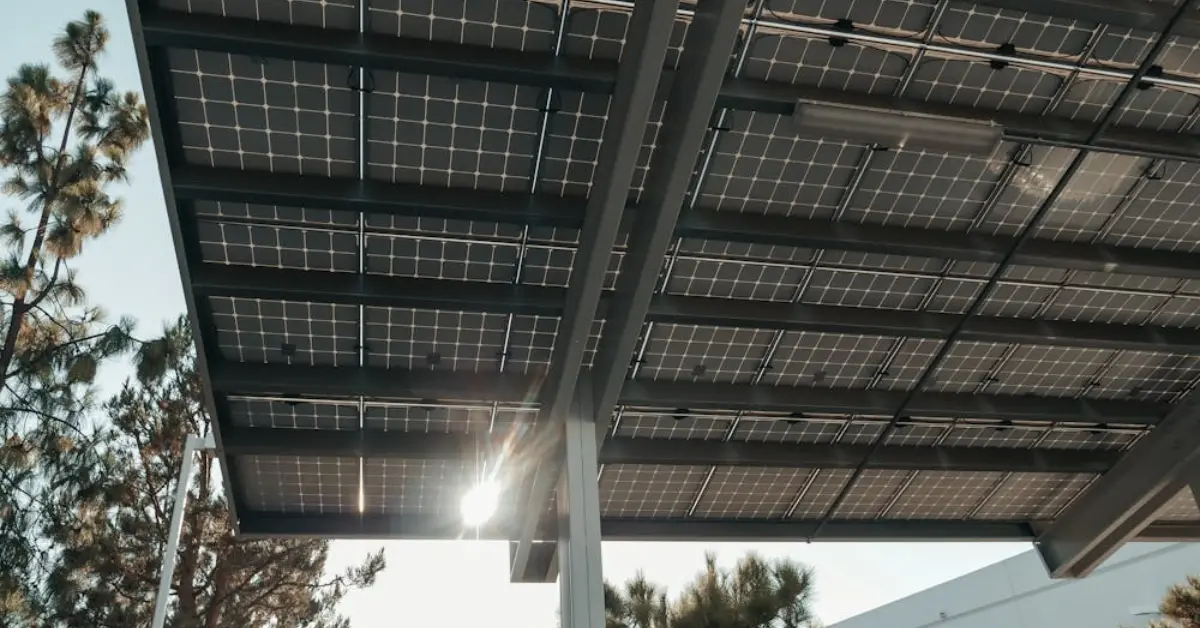
Energy Efficiency Improvements
Energy efficiency forms the backbone of an eco-friendly home. It reduces environmental impact and saves money —an ideal combination for UAE households balancing comfort and conservation.
Many residents are upgrading to smart systems that meet the targets of the Dubai Clean Energy Strategy 2050 while keeping interiors cool and efficient.
1. Switch to LED Lighting
Lighting can account for up to 15% of household electricity use. Replacing traditional incandescent bulbs with LEDs reduces consumption by around 90%. LEDs emit less heat, which lightens the cooling load. Over time, the savings from lower electricity use and bulb replacements make LEDs one of the fastest-payback green upgrades.
2. Install Energy-Efficient Appliances
Appliances labelled A-rated or Energy Star-certified are engineered to deliver maximum output with minimal energy input. Switching to these models can cut power bills by hundreds of dirhams yearly. In Dubai and Abu Dhabi, new residential projects often include built-in energy-saving white goods.
3. Add Smart Thermostats
With cooling systems running year-round, temperature control has a significant impact on your carbon footprint. A smart thermostat automatically adjusts temperatures based on your daily routine and external weather. Some models support remote control via mobile apps, allowing you to reduce consumption even when away.
4. Seal Drafts and Upgrade Insulation
A surprisingly large amount of cool air escapes through windows, doors, and poorly insulated walls. Sealing gaps and installing high-quality insulation help maintain a steady indoor temperature and keep your air-conditioning system from overworking. It results in energy savings and a quieter, more comfortable living space.
Consider inverter or VRF air-conditioning systems; they modulate output to meet demand and typically use 20–30% less energy than conventional split units.
5. Switch to a Tankless Water Heater
Traditional storage heaters continuously reheat large water tanks, even when not in use. Tankless or on-demand systems heat water instantly, using 8–34% less energy and reducing standby losses. They’re compact, durable, and ideal for smaller homes or apartments seeking both efficiency and convenience.
6. Install Solar Panels
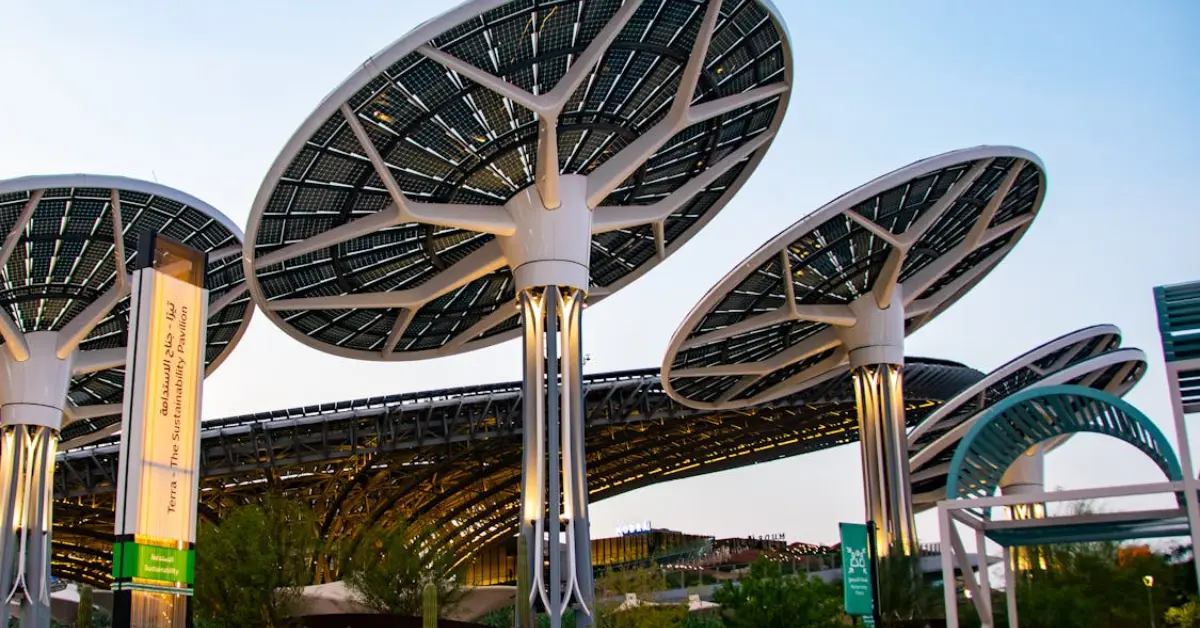
Solar panels are a long-term investment that pays off. Harnessing solar power in the UAE is a logical step towards sustainability. With over 3,500 hours of sunlight annually, solar systems can offset several tonnes of carbon dioxide per year. Government incentives and net-metering schemes make installation more accessible than ever, with payback periods of less than ten years in many cases.
Communities such as Dubai’s Sustainable City and Abu Dhabi’s Masdar City have already adopted large-scale solar systems.
Through DEWA’s Shams Dubai programme, residents can connect their solar systems to the city grid and receive credits for surplus energy.
Explore Sustainable Real Estate Practices in Dubai to find suitable areas for your needs.
7. Monitor and Automate Energy Use
Energy-tracking apps and smart plugs let you monitor real-time usage, identify waste, and automate devices to switch off during peak hours. By analysing data, homeowners can pinpoint inefficiencies and create personalised saving strategies.
Use Property Finder’s Data Guru tool to understand community-wide utility trends and benchmark your energy savings.
Water Conservation
Water is a precious resource in the UAE, where much of the supply is produced through energy-intensive desalination. By conserving water, you reduce costs and support national sustainability goals such as UAE Vision 2030 and Dubai’s Integrated Water Resource Management Strategy.
This aligns with the UAE Water Security Strategy 2036, which aims to cut total water demand by half over the next decade.
1. Collect Rainwater
Although rainfall is rare, every drop counts. Installing rain barrels or small harvesting systems helps collect seasonal rooftop rainwater for irrigation or cleaning. This can lower outdoor water consumption by 30–50%. Using rainwater also reduces the demand on desalination plants and decreases water bills for villa owners with gardens.
2. Install Low-Flow Toilets and Fixtures
Bathrooms account for nearly half of household water use. Low-flow taps, showerheads, and dual-flush toilets deliver intense water pressure while drastically reducing consumption. These fixtures are inexpensive, easy to install, and now standard in most new UAE developments aiming for Estidama or LEED certification.
3. Fix Leaks Promptly
Even a small, constant drip wastes thousands of litres per year. Regularly inspecting taps, pipes, and irrigation systems can prevent waste and mould growth. Many property management companies in Dubai now include smart water sensors that automatically alert homeowners to leaks.
Track unusual consumption via DEWA’s Smart Living dashboard to spot leaks early. Check Market Watch by Property Finder to see how developers integrate water-saving features across UAE projects.
Sustainable Materials and Construction
Building or renovating with sustainability in mind reduces emissions, limits waste, and promotes healthier living environments. The UAE’s leading developers, including Emaar and Aldar, are increasingly adopting eco-conscious designs, from recycled materials to energy-efficient façades.
1. Use Sustainable Flooring
Opt for bamboo, cork, or reclaimed wood, which regenerate faster than traditional timber. These materials add warmth and durability to your interiors while reducing pressure on forests. Bamboo, for instance, matures within five years compared to hardwood’s two decades, making it an ideal renewable choice.
2. Buy Furniture and Décor Secondhand
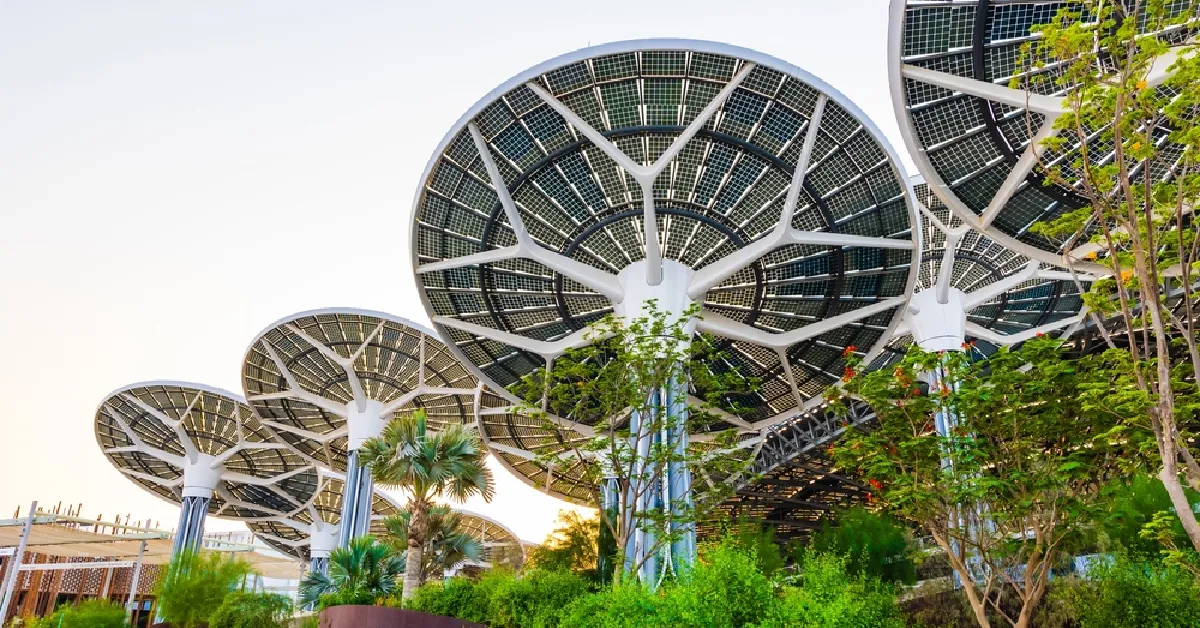
The UAE’s growing circular-economy culture makes it easy to source pre-loved furniture through online marketplaces, community swaps, or vintage boutiques. Refurbished pieces save resources, add unique charm, and help divert waste from landfills. Upcycling older items also allows for creative expression while reducing new manufacturing emissions.
3. Choose Eco-Friendly Building Materials
When renovating, prioritise low-VOC paints, FSC-certified timber, and recycled glass or steel. These reduce toxic emissions, creating safer indoor spaces and improving well-being. Locally sourced materials also minimise transportation impact, supporting regional industries.
Planning an upgrade? Estimate renovation returns with Property Finder’s Home Value Estimator to see how sustainable upgrades can increase your property value.
Waste Reduction Strategies
Waste reduction is central to sustainable living. The UAE’s Zero Waste 2030 initiative encourages residents to minimise landfill output by promoting recycling and composting. Making small changes at home can align your lifestyle with this national ambition.
Campaigns such as Dubai Can and Sharjah’s Waste-to-Energy Project, led by Bee’ah, are helping residents reduce plastic use and landfill waste.
1. Compost Kitchen and Yard Waste
By composting fruit peels, coffee grounds, and garden trimmings, households can transform organic waste into valuable fertiliser. Composting keeps around 180 kilograms of waste per family per year out of landfills, enriches garden soil, and reduces the need for chemical fertilisers.
2. Recycle Effectively
Set up clearly labelled bins for paper, glass, metal, and plastics. Many municipalities across Dubai, Sharjah, and Abu Dhabi provide designated drop-off areas. Teaching children the recycling code early encourages lifelong habits that protect the environment.
3. Reduce Single-Use Plastics
Replacing disposable cups, bags, and bottles with reusable options is one of the most powerful lifestyle changes you can make. The UAE’s ban on single-use plastic bags, already in effect in several emirates, shows how minor adjustments can drive collective impact. Learn how Sustainable City Community Insights can help see how UAE communities are encouraging zero-waste living.
Healthy Indoor Environment
A home’s sustainability isn’t only about what’s outside; the indoor environment directly influences health and comfort. Air quality, cleaning products, and ventilation play significant roles in achieving a truly green home.
Given the UAE’s climate, indoor air quality is crucial to well-being, especially for families with children or those with allergies.
1. Switch to Natural or Zero-VOC Paints
Paint fumes from conventional products release volatile organic compounds that can trigger headaches and respiratory issues. Zero-VOC paints made from natural pigments reduce toxins and odours. They also last longer, retaining colour without peeling, which minimises the need for frequent repainting.
2. Adopt Eco-Friendly Cleaning Products
Eco-friendly cleaning agents rely on natural ingredients such as vinegar, essential oils, and lemon. They are biodegradable, safer for children and pets, and protect waterways from harmful runoff. Choosing refillable packaging or concentrated formulas further cuts plastic waste. Explore family-friendly homes for sale in Abu Dhabi with superior indoor air quality and green-certified features.
Sustainable Gardening and Food
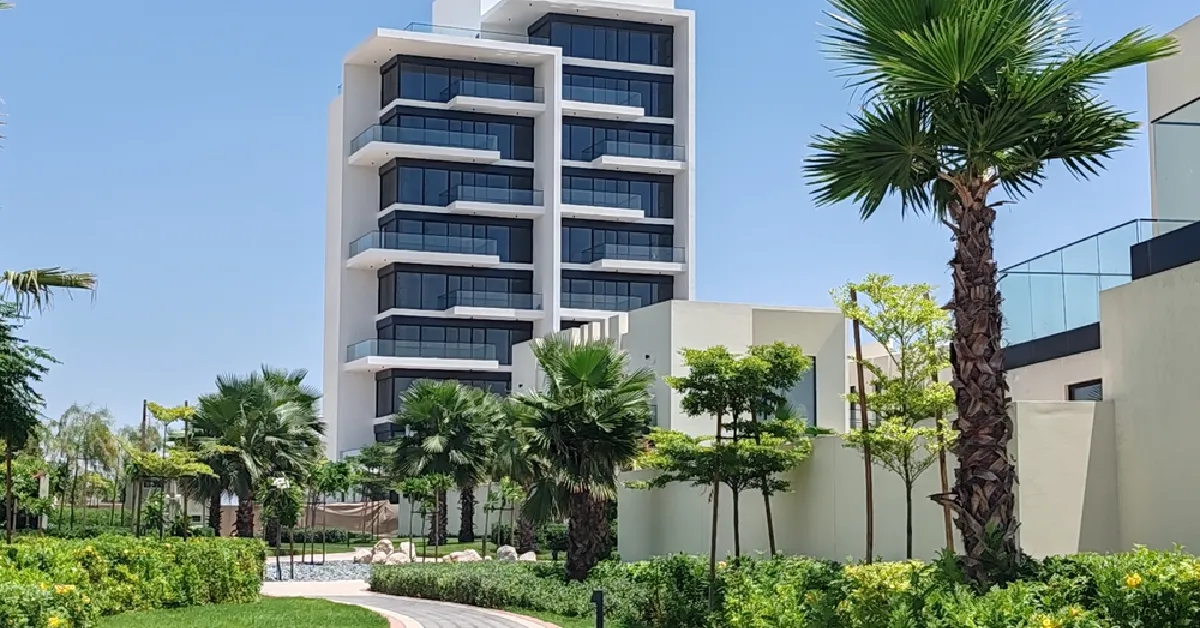
Gardening sustainably enhances biodiversity and turns outdoor spaces into productive, eco-friendly retreats. It also reconnects residents with nature, something increasingly valued in urban life.
Initiatives such as Greening Dubai and the Green Heart of the UAE support the use of native plants and community gardens to boost urban biodiversity.
1. Grow Your Own Food
From basil on a balcony to tomatoes in a courtyard planter, growing your own produce is practical and rewarding. It reduces reliance on imported goods and eliminates plastic packaging. Many villa communities in Dubai, such as Arabian Ranches and Al Barari, encourage residents to create mini-vegetable plots.
2. Use Native Plants and Wildlife-Friendly Gardening
Choosing native species like ghaf trees, acacia, and desert grasses ensures resilience in the UAE’s hot, dry climate. Native plants need minimal watering and fertiliser, cutting maintenance costs and conserving resources. Pairing them with bird feeders or small water features attracts pollinators and wildlife.
How to Be Environmentally Friendly at Home
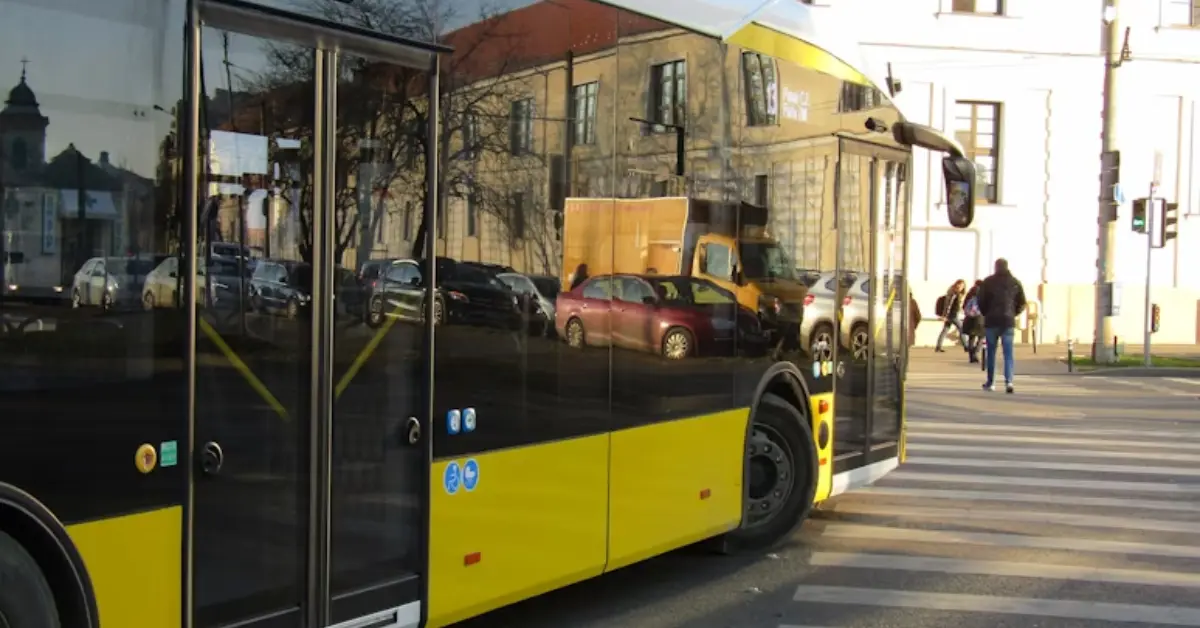
Being environmentally friendly at home doesn’t always require significant investments; small, consistent actions can make a meaningful difference. Here are simple ways to live greener every day in the UAE:
- Switch Off and Unplug: Turn off lights and electronics when not in use. Smart plugs make automation easy.
- Choose Reusables: Replace single-use plastics with reusables.
- Recycle Properly: Separate waste into recyclables.
- Buy Local and Seasonal Produce: Support UAE farmers’ markets or local grocers.
- Plant and Nurture Greenery: Grow potted herbs or native plants to improve air quality and promote biodiversity.
- Reduce Water Waste: Install low-flow taps, reuse greywater for plants, and water gardens in the early morning or evening.
- Opt for Public Transport or Carpooling: Combine errands, share rides, or use the Dubai Metro or RTA’s electric buses to reduce emissions.
- Repurpose and Donate: Donate old clothes and furniture to local charities.
For more green living ideas, explore Green Areas in Dubai that promote eco-friendly lifestyles.
Here’s how eco-friendly upgrades compare to traditional alternatives in the UAE context:
| Area | Eco-Friendly Upgrade | Traditional Alternative | Environmental Impact |
| Lighting | LED bulbs | Incandescent | 90% less energy use |
| Heating Water | Tankless water heater | Storage tank | 8–34% less energy |
| Flooring | Bamboo/Cork/Reclaimed | New hardwood | Lower deforestation |
| Paint | Zero-VOC/Natural | Conventional | Improved indoor air quality |
| Gardening | Compost, Native plants | Chemical fertilisers | Better soil & biodiversity |
| Water Use | Rainwater harvesting | Municipal supply only | Up to 50% savings |
| Air conditioning | Inverter/VRF system | Conventional split unit | 20–30% less energy use |
Key Takeaways
Transforming your home into an eco-friendly space is a journey of consistent, thoughtful changes. Start small with LEDs, insulation, and water-saving fixtures, then invest in solar panels, native landscaping, and smart automation. Each step contributes to reduced emissions, lower bills, and a healthier environment.
Sustainable homes not only benefit the planet but also offer greater long-term value, aligning with the UAE’s vision for carbon neutrality by 2050. By choosing greener materials, reducing waste, and embracing conscious habits, homeowners play a vital role in shaping the future of sustainable living across the Emirates.
FAQs
Switching to LED lighting and sealing drafts are inexpensive improvements that quickly reduce utility bills.
Use a sealed countertop or under-sink compost bin. Empty it weekly into a community compost or outdoor planter.
Yes. With consistent sunlight year-round, most homes can recoup installation costs within 7–10 years while saving thousands in electricity costs.
Absolutely. Zero-VOC paints reduce indoor pollutants, helping to prevent allergies and improve overall well-being.
Use reusable bottles, mugs, and cloth shopping bags. These small steps prevent hundreds of disposable items from ending up in landfills each year.
Yes. Demand for green-certified communities and solar-ready homes is rising, often translating into greater long-term value and buyer interest